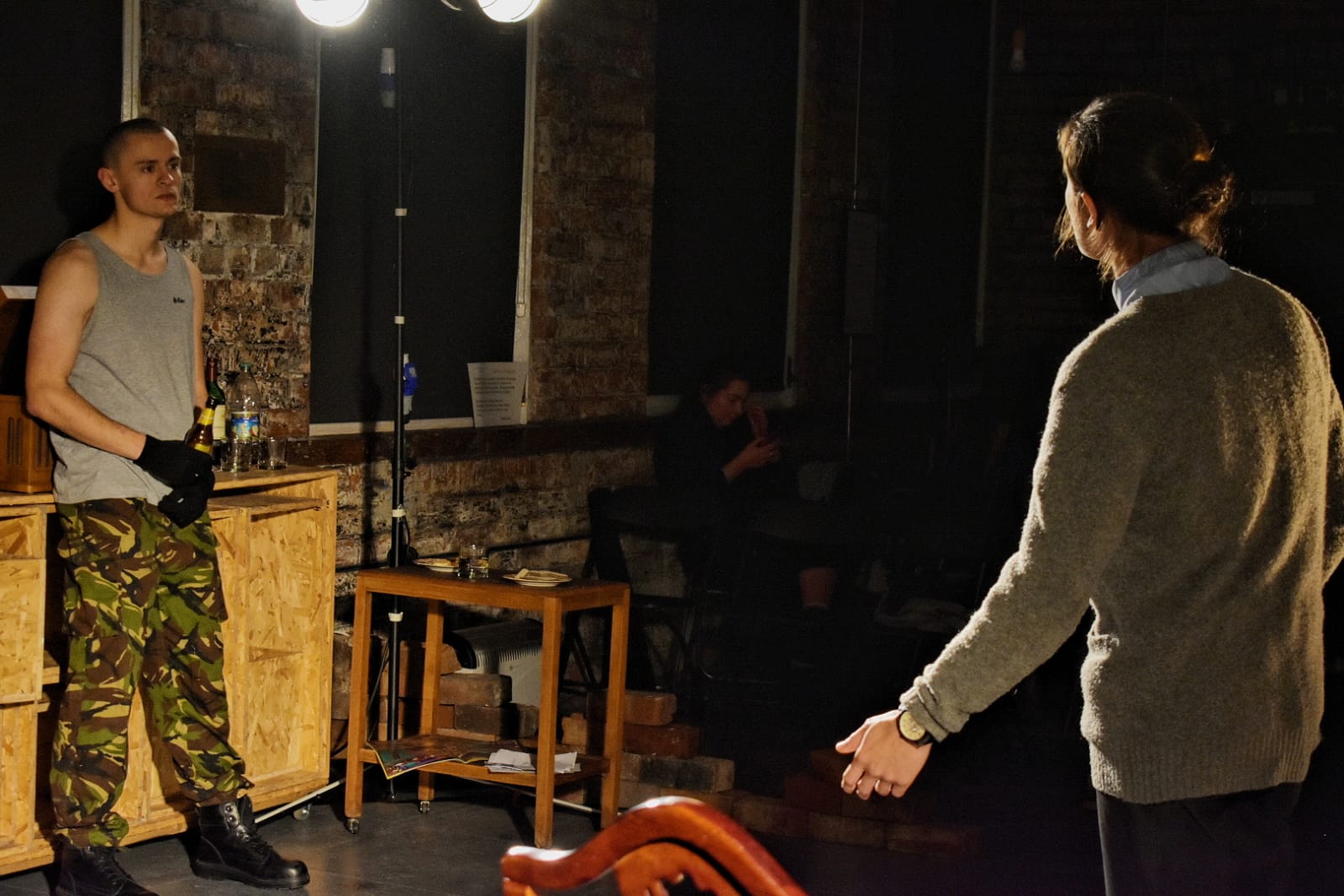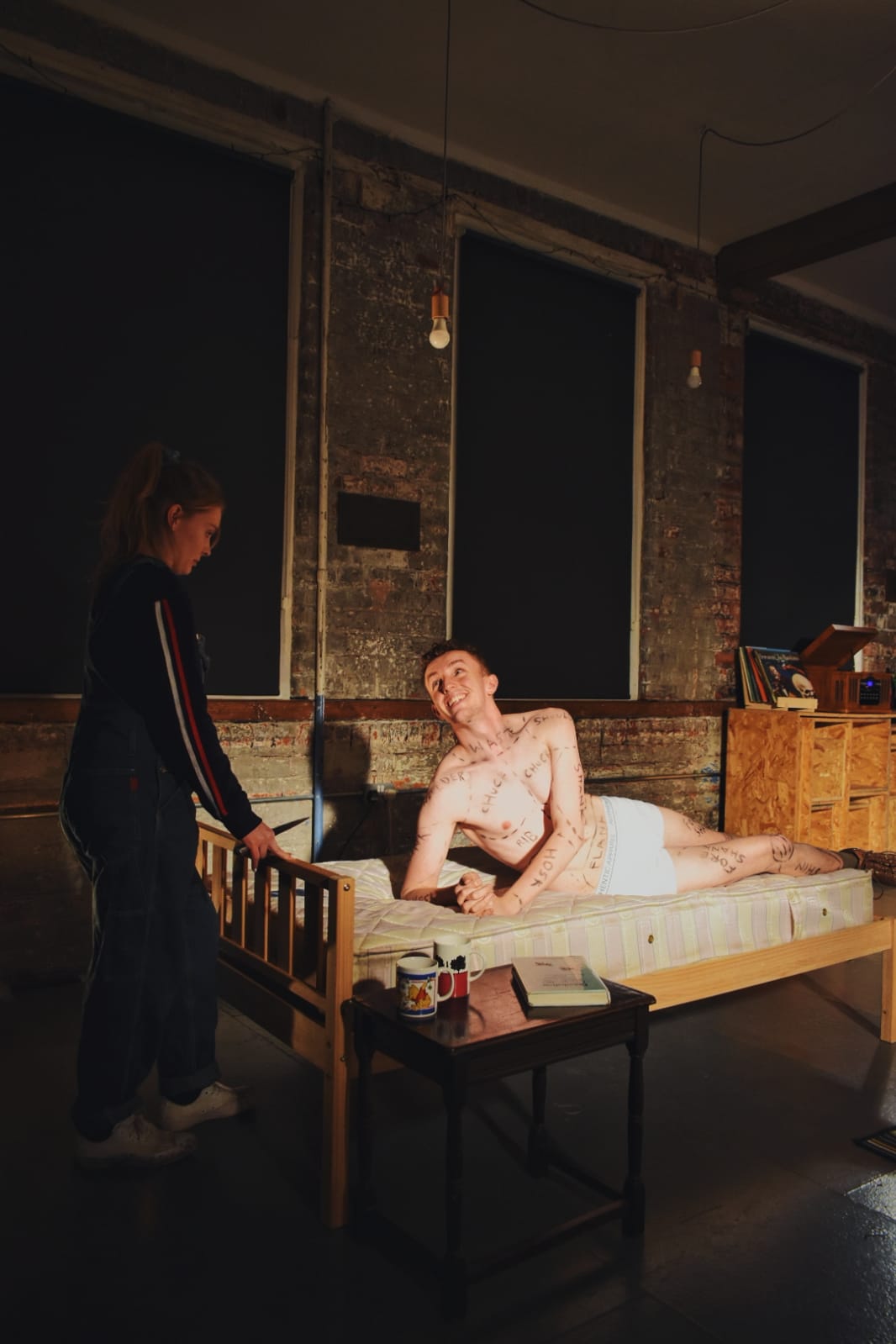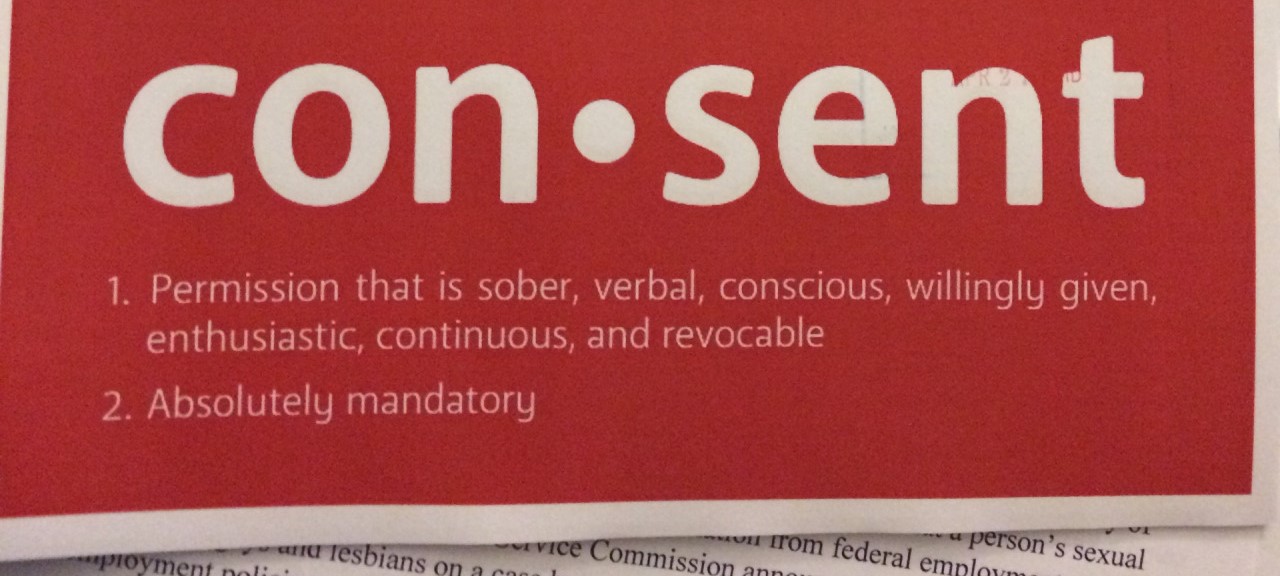James Huxtable’s new play, A Few Short Studies On Cannibalism, begins with a silence that lingers just a moment too long, a precursor for the uncomfortable confrontation that will follow. And I say that in the best way, though only his 3rd play, Huxtable isn’t shying away from big questions as his newest offering is inescapably political and challenging. Though the title suggests a kind of thriller-movie gore, the play is deeply rooted in day-to-day morality as it questions the audience on everything from religion, to pop culture, to the lines and limits of political rhetoric.

It begins immediately as the Kelsey, played by Harriet Anderson, enters the minimal kitchen set positioned in the centre of the audience. Addressing the audience, her monologue is violent and deliberately aggravating as the character speaks of violence against men as a feminist act. Dressed in distinctly normal clothes, the character of Kelsey is unexpectedly confrontational, pointing at the audience as she spits her sermon of slaughter. There’s no rest in this opening study as Huxtable holds back on the humour, leaving the character as a sinister figure from start to finish, forcing the audience to consider their own stance. It makes the choice to place the stage in the centre of the audience interesting, as I found myself looking to the men across from me, attempting to process their feelings on a monologue that is so divisive. I saw men looking down, women with their head in their hands and even one woman crying, possibly a reaction to the character’s description of assault. The range of emotion seen in one corner of the audience immediately speaks to the power of Huxtable’s writing, opening the play with such a punch that I couldn’t help but wonder what was coming next, with feelings of anticipation and fear.
The second study sees the return of Huxtable’s dark, unconventional humour, as Joe Kinch, playing Flesh, steps onto the stage undressed and marked up like a Butcher’s cow. The contrast between Kinch’s ditzy Flesh and India Willes as the imposing and in-charge woman makes the scene dynamic and gripping with the perfect balance between humour and tension. The subject matter is a familiar one; a young woman’s experience within the music industry and the limits of our sex sells culture. But the conversation of cannibalism as the woman and flesh discuss contracts in a pre-arranged agreement that she will murder and eat him, leads to a confusing moral watch. Honing in on audience members across from me, there were looks of confusion as the audience grappled with their own opinion in the final violent moments. Huxtable writes no good characters, in the best way. Not one of his characters is wholly likeable or agreeable, his best work comes when he’s writing evil, sinister people with charm so intense you can’t help but laugh at their jokes. This scene shows that best as he allows no sway, no room to pick a side in this debate so the audience simply has to sit and take it. In his most political work yet, Huxtable takes no stance. His characters open up questions, leaving them to the crowd as the lights dim at what seems like only the start of something. For people that demand resolution, I can see why his work may not be for you. For people rigid in their beliefs and unwilling to loosen the ties of their morals for an hour or two, maybe skip this one. This show demands an unshaken, active audience, ready to sit and watch, questioning the whole time.
The climax of the play truly comes when Huxtable himself steps onto the stage in the final of the studies with Matthew Bevan. Playing unlikely friends, Huxtable as ex-con Jared and Bevan as Marty, a priest, the scene begins slower than others as Huxtable sways along to the music from a record play and sips wine. His transformation for the role has to be noted as he shaved his head and trained to make the character more muscular, his work truly leaves no detail untouched. Playing a role he wrote for himself, you would hope that he would be excellent, and he was. In contrast to Bevan’s sweet bumbling Marty, Jared is unnerving. From his twitch to the way he regularly stretched out his neck and licked his lips, Jared was imposing and unsettling as Huxtable took on a character head-to-toe. This study has all the key features of a Huxtable piece; dark humour, unsettling pauses, intense builds that provide no relief, clever use of music. To have such a recognisable and refined style so early in his career speaks volume for the confidence and self-assurance Huxtable seems to have in himself as a writer, so it was nice to see him display the same attitude in his acting.
As scene partners, Huxtable and Bevan are a match made in heaven. You can tell they are friends off-stage as they appear to ride each other’s waves of spontaneity and improvisation flawlessly. As Bevan ebbs into an impassionate monologue, Huxtable flows into a witty remark, providing a moment of guilt-tinged comic relief as we chuckle at humour so dark you know you should gasp. In such a short scene, each study lasting around 20 minutes, these characters especially go through an intense development as they touch on a number of issues from the political situation in Ireland to an underlying discussion of homosexuality and free will. Unafraid of a big question, the scene hangs on the timeless debate; ‘if this is a sin, why did God make me this way?’. It’s the opening up of this debate that leads the audience to undeniably feel a strange sense of empathy for Jared, one of the most tragically twisted characters I’ve seen on stage. As he tells Marty of the precautions, he’s taken to be untraceable, from cutting off his fingerprints to living in abandoned houses, his sinister performance comes with an underbelly of deep sadness as he lives completely in fear of the places his instinct to eat people may take him.
Throughout cannibalism steps in as a symbol for other things. Rape culture, punishment, a desire to steal power from another, the differing worth society places on gendered flesh, homosexuality, general inequality through race, gender and religion; the discussion of cannibalism becomes almost silly and humorous when the audience knows he was addressing bigger fish the entire time. Strangely, it is the addition of cannibalism that prevents the piece from becoming too political. The outrageousness of Kelsey packing a dog bowl full of meat for the victim she keeps downstairs as a pet, the ridiculousness of Flesh’s nudity in such a twisted scene, Marty holding onto the cross in his pocket as Jared announces his desire to eat people; somehow the topic brings relief, allowing a slight escape from the depth of the subject matter that is truly being dealt with. While I left the play feeling exhausted and challenged, I also left with a slight stitch from laughing as punchy one-liners, cutting through the darkness with the absurd.
My only wish for the piece was for a stronger opening performance. For such an intense and divisive subject matter, I wish the performance would have been more over the top. Anderson switched from a soft tone to yelling and swearing, but I would’ve liked more commitment to one side or the other, either playing Kelsey as a sinisterly soft-spoken psychopathic character, or an actively aggressive figure. I think the swaying midground can be put down to nerves, carrying the opening scene all alone through a monologue is a scary feat for any actress, but pared with such a small and intimate set with an audience on either side, I can imagine it’s an intimidating role to step into. With these being the preview performances, I have no doubt this will be refined and perfected over time, but I would’ve liked more commitment to and consideration of the character’s voice.
Overall, this was my favourite of Huxtable’s shows so far. With each one, his style becomes more and more refined and perfected, so I’m excited to see where he goes being only right at the very start of his career. With some refinement, I believe this show has huge potential being a piece unlike anything I’ve seen in a long time. Intense and challenging but never too much, Huxtable provides no rest and takes no prisoners, but still wants his audience to have a good time. We all walked out questioning and confused but energised, just as any piece of theatre should leave you.





